Besides Bitcoin, Ethereum is one of the most decentralized Blockchain platforms currently with thousands of nodes around the world. So the truth is whether Ethereum is decentralized or not and where are the dark sides of this factor in the Ethereum network? Let’s find out together in the article below.
To better understand this article, people can refer to some of the documents below:
- What is a Validator? The Difference Between Validator And Miner
- What is Ethereum?
- What Are Liquid Staking Derivatives (LSD)? Top 5 LSD Projects with Great Growth Potential
Statistics About Ethereum’s Decentralization
Currently, according to records from Etherscan, the Ethereum network notes:
- There are nearly 12K Nodes participating in operating the Ethereum network.
- There have been more than 24M ETH added to Staking with a total of 778,951 Validators.
The numbers all show that the Ethereum network since the transition from PoW to PoS has had strong growth in the number of Nodes as well as Validators. If we just look at these numbers, we will easily be mistaken into thinking that Ethereum is becoming more and more decentralized when switching to PoS.
Is Ethereum Decentralized?
During the Korea Blockchain Week event taking place in Seoul, South Korea, Ethereum founder Vitalik Buterin shared about 4 issues that Ethereum needs to solve in order to fully decentralize the network. . Besides, Vitalik also affirmed that the above problems can be completely solved in the future but it will take a lot of time, maybe 10 years or even 20 years.
So what are the factors that are reducing the decentralization factor on the Ethereum network?
Node deployment infrastructure
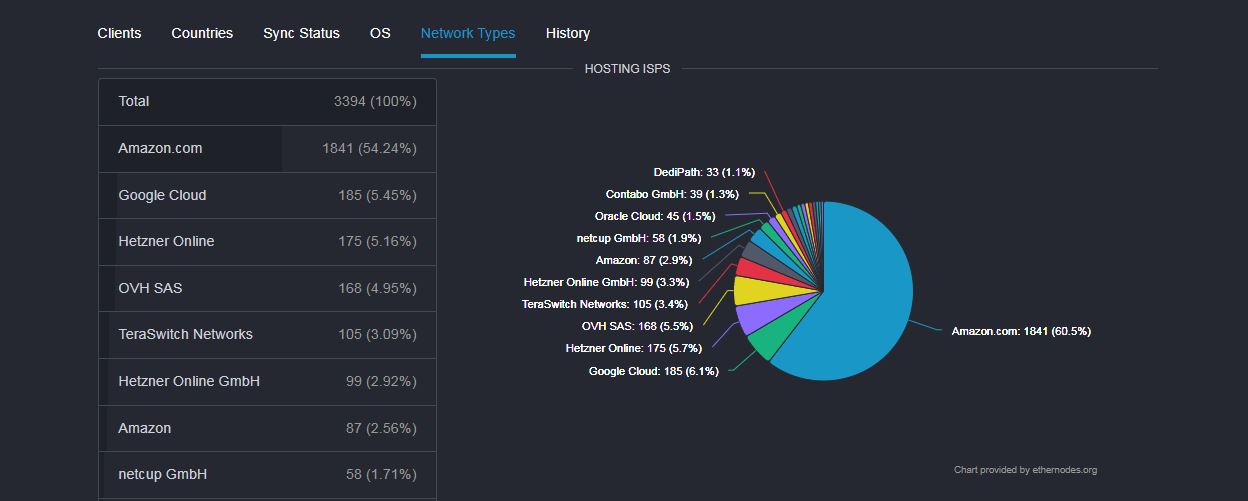
Currently, Nodes operating the Ethereum network are concentrated up to 60% on AWS provided by Amazon. So why are Nodes on Ethereum mainly located on AWS? There are some reasons below:
- Ability of extension: AWS offers a wide range of compute, storage, and network resources that can be used to run Ethereum Nodes. This allows service providers to run large-scale and high-performance nodes.
- Ready: AWS has a global network of data centers, which helps ensure that Ethereum Nodes are always available.
- Expense: AWS offers flexible pricing for compute, storage, and network resources. This helps service providers reduce the costs of operating Ethereum Nodes.
Besides, AWS also provides a number of features and services to support the operation of Ethereum nodes. For example, the Amazon Managed Blockchain service allows service providers to easily set up and manage Ethereum Nodes. But we have some problems here:
- Node operates a Blockchain aimed at decentralization but is built on a centralized platform such as Amazon, Google Cloud,…
- 60% of Nodes operated on Amazon is an alarming number. If AWS has problems, the entire Ethereum network will also suffer.
The proposed solution is that in the long run Ethereum Foundation will be optimal for users to be able to run Node with the cheapest and least expensive hardware, simply with just a phone. These upgrades will be in The Verge and The Purge stages.
Clients also cause trouble
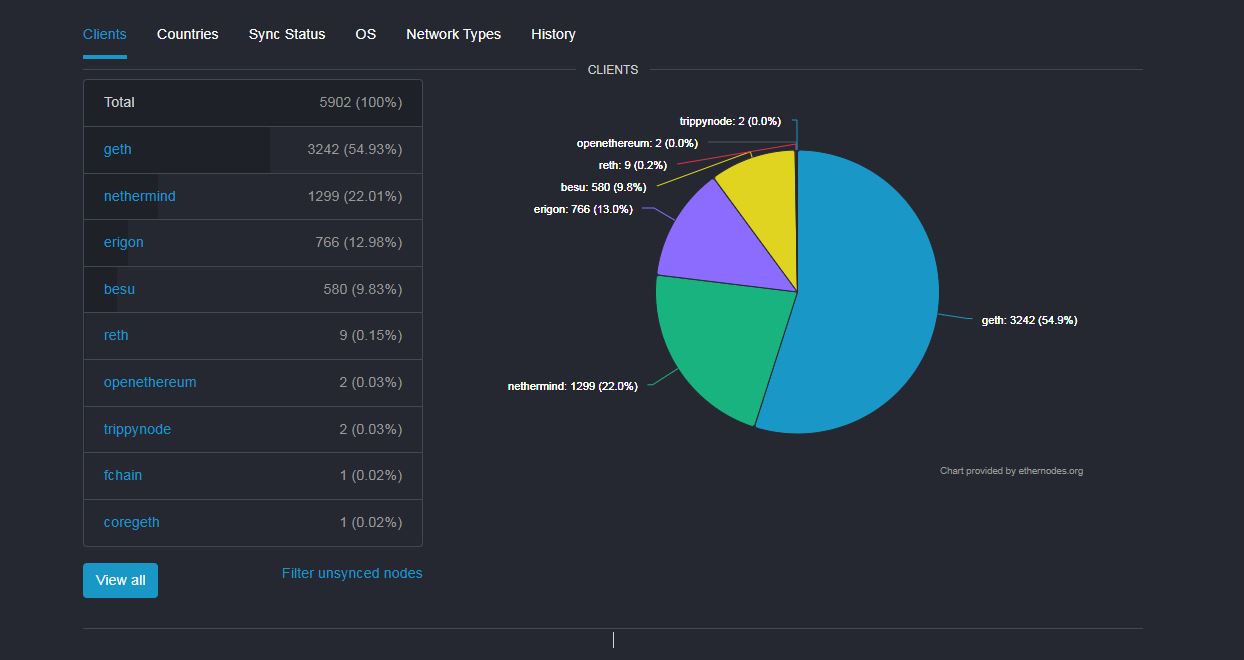
A client on the Ethereum network is a software program that interacts with the Ethereum network. The Client can be used to perform operations such as creating & managing assets, sending & receiving funds, creating & executing Smart contracts or accessing & interacting with DApps. There are many different Client benefits such as:
- Geth: A fully functional client for the Ethereum network. It is developed by the Ethereum Foundation, a non-profit organization that supports Ethereum development.
- Nethermind: Is a fully functional client for the Ethereum network. It was developed by Parity Technologies, a software company specializing in Blockchain.
- Besu: Is a fully functional Ethereum client written in Java. It was developed by ConsenSys, a software company specializing in blockchain. Besu is a popular Ethereum client, used by developers, users, and businesses.
- OpenEthereum: Is a fully functional Ethereum client written in Rust. It was developed by a team of independent developers, with the goal of providing a high-performance and secure Ethereum client.
Currently, Geth accounts for 55% of the total number of Clients on the entire Ethereum network. Geth becoming too popular is not a good thing for the Ethereum network either.
LSD & Lido Finance are creating real worries
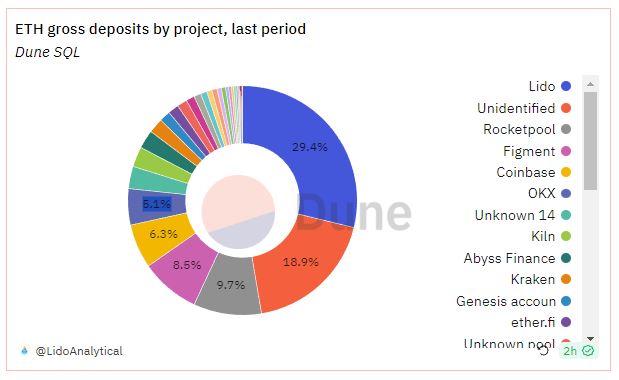
One problem that is causing headaches for the Ethereum community is that the amount of ETH staked is mainly on Lido Finance and this platform is gradually reaching 30%, this, according to the Ethereum community, has shared with each other that it affects seriously affects the decentralization of Ethereum.
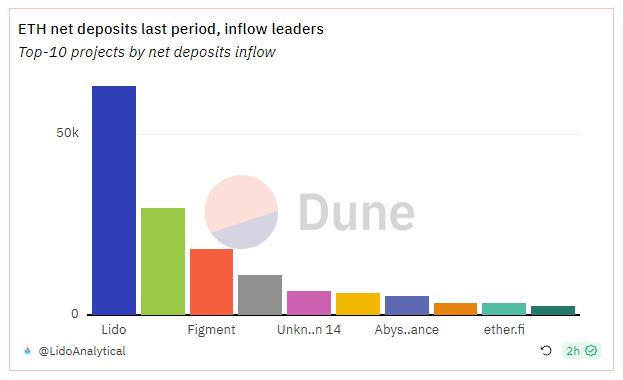
Not only that, the rate of ETH pouring into Lido Finance still shows no signs of stopping. This issue was discussed and led to a proposal to limit the amount of ETH put into Lido Finance, but this proposal was not approved. The only hope for the Ethereum community today is the Lido V2 version with the Staking Router at its heart.
With Staking Router, instead of all the user’s ETH being transferred to Lido Finance’s 31 Validator partners on Ethereum, it will allow more Validators to be deployed from anyone from users to organizations. or DAOs, DVT projects,… This helps the amount of ETH deposited into Lido Finance to be distributed to many different Validators, making the Ethereum network not lose its decentralization when the amount of ETH poured into Lido Finance too much.
America is the cradle of Ethereum
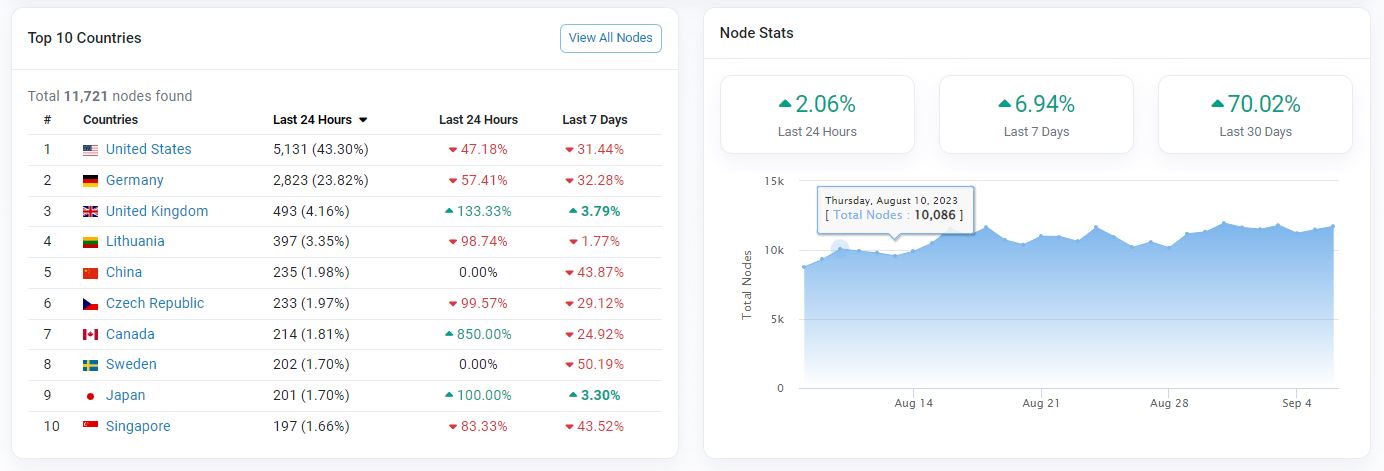
Currently, the number of Nodes operating the network is concentrated at nearly 50% in the US, 15% in Germany and only about 4% in Singapore. This also raises concerns that the US, especially the SEC, is taking a hawkish stance on Bitcoin in particular and the entire cryptocurrency industry in general.
We have seen this problem when China officially banned Bitcoin mining, which caused the Hashrate on Bitcoin to decrease sharply. That was the time when political networks had a certain influence on the Crypto market through “physical interaction”. ” with the project with the highest market capitalization. Luckily Bitcoin got through without any problems.
Decentralization is not a pressing problem
According to Vitalik Buterin, the issue of decentralization of the Ethereum network is very important but not the current pressing issue. Currently, the Ethereum development team is focused on scalability and more specifically updates like EIP 4488 and Cancun Upgrade to reduce transaction fees on Layer 2 platforms. Until Layer 2 platforms 2 has cheap fees, then the issue of network decentralization will be of interest again.
Raising the question: Is Ethereum Decentralized helps people gain a new, diverse and multi-dimensional perspective on the Ethereum network.


